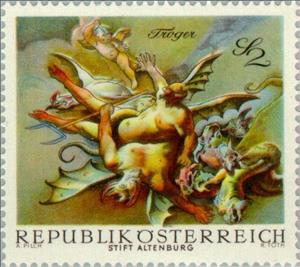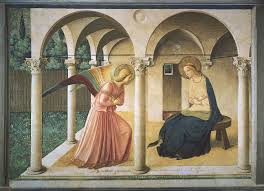Stamp: Fresco in Abbey Altenburg (Austria 1968)
Fresco in Abbey Altenburg (Austria 1968)
11 December (Austria ) within release Frescos goes into circulation Stamp Fresco in Abbey Altenburg face value 2 Austrian schilling
| Stamp Fresco in Abbey Altenburg in catalogues | |
|---|---|
| Michel: | Mi:AT 1278 |
| Yvert et Tellier: | Yt:AT 1108 |
Stamp is horizontal format.
Also in the issue Frescos:
- Stamp - Fresco in Abbey Altenburg face value 2;
- Stamp - Fresco at Röhrenbach - Greillenstein face value 2;
- Stamp - Fresco in Abbey Melk face value 2;
- Stamp - Fresco in Church "Maria Treu" in Vienna face value 2;
- Stamp - Fresco in Castle Ebenfurth face value 2;
- Stamp - Fresco in Castle Halbthurn: Allegory of time and light face value 2;
Stamp Fresco in Abbey Altenburg it reflects the thematic directions:
Goliath (/ɡəˈlaɪəθ/ gə-LY-əth) was a Philistine giant in the Book of Samuel. Descriptions of Goliath's immense stature vary among biblical sources, with texts describing him as either 6 ft 9 in (2.06 m) or 9 ft 9 in (2.97 m) tall. According to the text, Goliath issued a challenge to the Israelites, daring them to send forth a champion to engage him in single combat; he was ultimately defeated by the young shepherd David, employing a sling and stone as a weapon. The narrative signified King Saul's unfitness to rule, as Saul himself should have fought for the Kingdom of Israel
Religion is any cultural system of designated behaviors and practices, world views, texts, sanctified places, ethics, or organizations, that relate humanity to the supernatural or transcendental. Religions relate humanity to what anthropologist Clifford Geertz has referred to as a cosmic "order of existence". Different religions may or may not contain various elements ranging from the "divine", "sacred things", "faith", a "supernatural being or supernatural beings" or "some sort of ultimacy and transcendence that will provide norms and power for the rest of life". Religious practices may include rituals, sermons, commemoration or veneration (of deities), sacrifices, festivals, feasts, trances, initiations, funerary services, matrimonial services, meditation, prayer, music, art, dance, public service, or other aspects of human culture. Religions have sacred histories and narratives, which may be preserved in sacred scriptures, and symbols and holy places, that aim mostly to give a meaning to life. Religions may contain symbolic stories, which are sometimes said by followers to be true, that have the side purpose of explaining the origin of life, the Universe and other things. Traditionally, faith, in addition to reason, has been considered a source of religious beliefs. There are an estimated 10,000 distinct religions worldwide. About 84% of the world's population is affiliated with one of the five largest religions, namely Christianity, Islam, Hinduism, Buddhism or forms of folk religion.
n Christian belief, a saint is a person who is recognized as having an exceptional degree of holiness, likeness, or closeness to God. However, the use of the term saint depends on the context and denomination. In Catholic, Eastern Orthodox, Anglican, Oriental Orthodox, and Lutheran doctrine, all of their faithful deceased in Heaven are considered to be saints, but a selected few are considered worthy of greater honor or emulation. Official ecclesiastical recognition, and veneration, is conferred on some denominational saints through the process of canonization in the Catholic Church or glorification in the Eastern Orthodox Church after their approval.In many Protestant denominations saint refers broadly to any holy Christian, without special recognition or selection.
Fresco (pl. frescos or frescoes) is a technique of mural painting executed upon freshly laid ("wet") lime plaster. Water is used as the vehicle for the dry-powder pigment to merge with the plaster, and with the setting of the plaster, the painting becomes an integral part of the wall. The word fresco (Italian: affresco) is derived from the Italian adjective fresco meaning "fresh", and may thus be contrasted with fresco-secco or secco mural painting techniques, which are applied to dried plaster, to supplement painting in fresco. The fresco technique has been employed since antiquity and is closely associated with Italian Renaissance painting.
he Baroque or Baroquism is a Western style of architecture, music, dance, painting, sculpture, poetry, and other arts that flourished from the early 17th century until the 1750s. It followed Renaissance art and Mannerism and preceded the Rococo (in the past often referred to as "late Baroque") and Neoclassical styles. It was encouraged by the Catholic Church as a means to counter the simplicity and austerity of Protestant architecture, art, and music, though Lutheran Baroque art developed in parts of Europe as well





